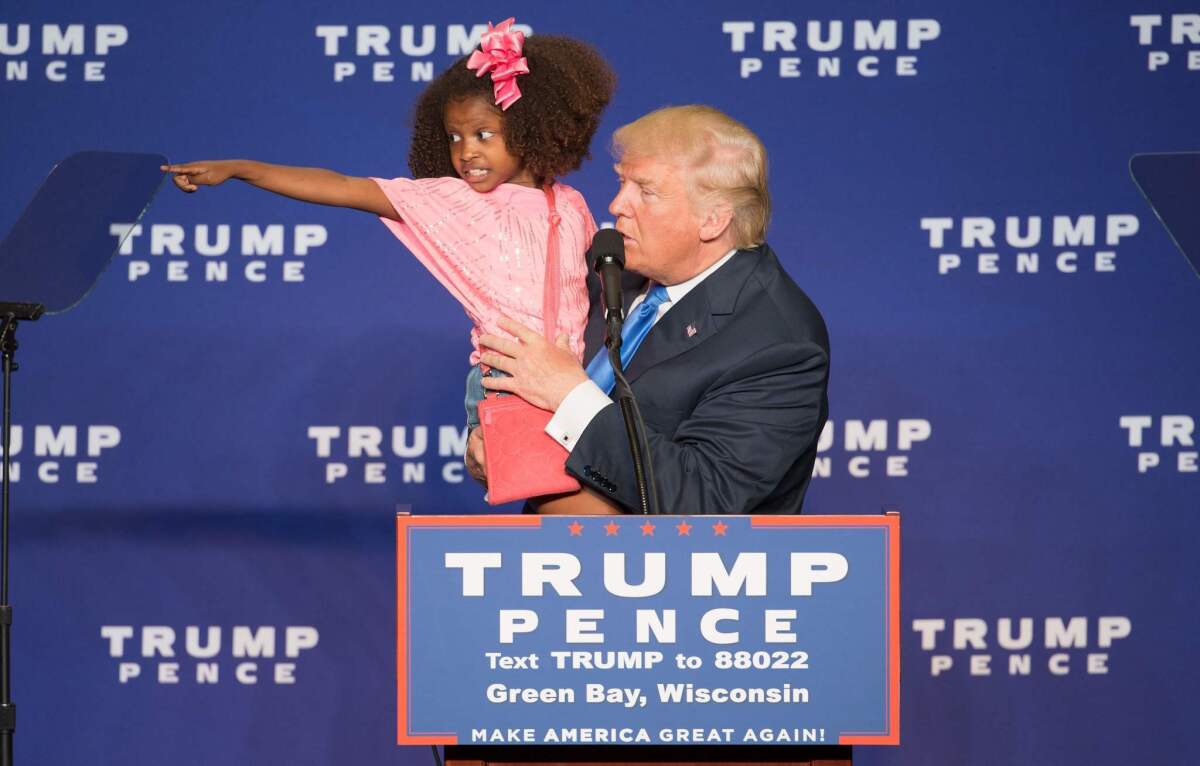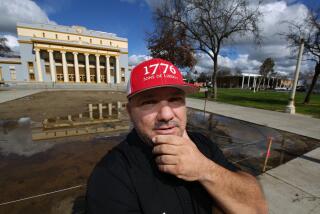Opinion: Why I’ve started to tell my kids Donald Trump is a bad man

Raising small children provides a unique lens through which to view an election. I have three boys, two of whom are 4-year-old twins with enough sense to detect the anxiety their mother and father feel over Tuesday’s vote. They overhear NPR broadcasts while riding in the back seat of our car and are, by now, familiar with the voices of Democratic nominee Hillary Clinton and Republican Donald Trump. After all these months they’ve gathered that the woman speaks calmly and in more positive terms than the man who shouts and insults.
So I can’t blame them for forming their first political opinion: Donald Trump is a bad man.
This is not a development my wife and I take lightly, not least because our boys love and respect their Trump-supporting relatives as much as their parents do. We want our children to develop their own values and beliefs without feeling they must match ours. So my wife and I refrain from open political discussion in their presence (although we have grown quite adept at speaking in code). But that doesn’t mean they live in a vacuum, and it’s foolish to think they can avoid exposure to a campaign that has persisted for one-third of their lives.
Below is a partial list of Trump outrages that we felt compelled to put into terms our preschoolers would understand.
He hurts women — emotionally and, if we are to believe his own boasting, physically. The Access Hollywood tape and the torrent of abuse allegations that followed are what prompted my wife to answer one of my kids with refreshing and forceful moral clarity after holding back for months. When he asked recently what we thought of Trump, I demurred as I had in the past: I’m not voting for him, but a lot of people are, and they have their reasons.
My wife, apparently having none of it, interrupted: Donald Trump is not a good person, she said, since he has repeatedly and proudly attacked women who aren’t all that different from Mommy.
Other sons would be so lucky to have such an honest mother.
He lies. Compulsively, unflinchingly, inexplicably. Yes, Clinton massages the truth too, but not with the cartoonish frequency her critics insist and not in a way that raises questions about her grip on reality. Example: During the third debate she deflected on a question about a speech she gave to bankers by mentioning Trump’s soft spot for Russian President Vladimir Putin. This was clumsy and did a disservice to voters concerned about Clinton’s possible conflicts of interest, but it doesn’t come close to matching Trump’s reflexive denial of verifiable truths. In that debate alone, Trump shouted “wrong” when Clinton pointed out, correctly, that he had mocked a New York Times reporter with a physical disability; he bizarrely suggested the operation in Mosul against Islamic State was undertaken to help Clinton; and he again insisted — for the umpteenth time in this campaign, and despite clear, irrefutable evidence that consists of his own voice attesting to the contrary — that he opposed the 2003 invasion of Iraq before it began.
One should not casually accuse another of lying, but my kids face scolding for far less brazen acts of dishonesty.
He is a name caller. “Such a nasty woman” is only Trump’s latest highlight in this category’s lengthy reel. Previously, he said the Republican voters of Iowa were “stupid” when polls suggested he might not win that state’s caucuses. He has also used the s-word to insult Jeb Bush, Hillary Clinton, President Obama and journalists. He tends to save his most colorful insults — thug, rapist, murderer, fat pig, eating machine, you get the idea — for people who are not white or male.
For my kids, name calling is a punishable offense. When Trump does it, adult voters find it charming.
He lacks empathy. This is a big one, as I feel instilling a strong sense of empathy is important for children to develop a good moral compass. Now, my kids don’t come to me dismayed by Trump’s inability to understand the feelings of others, but they sense a meanness that I can only attribute to the Republican’s lack of empathy.
Consider: What am I supposed to say to my kids about a man who openly threatens and demeans people of color and women when most of the authority figures in their lives — their preschool teachers, babysitters and, God willing, the next president — are women and people of color? What should I tell them when he codes his misogynistic attacks on Clinton by questioning her “stamina” and making fun of her for being sick while they watch their very ill mother summon all the stamina she has to fight and survive cancer? Do I tell them this is all merely politics, a civil disagreement between two equally competent, sober adults who respectfully seek our votes?
You can talk about Clinton’s shortcomings in those terms, but not Trump’s. That this election pits a fundamentally decent person against an unempathetic bully might be lost on millions of adult voters, but not my 4-year-old kids.
Follow the Opinion section on Twitter @latimesopinion and Facebook
More to Read
A cure for the common opinion
Get thought-provoking perspectives with our weekly newsletter.
You may occasionally receive promotional content from the Los Angeles Times.







